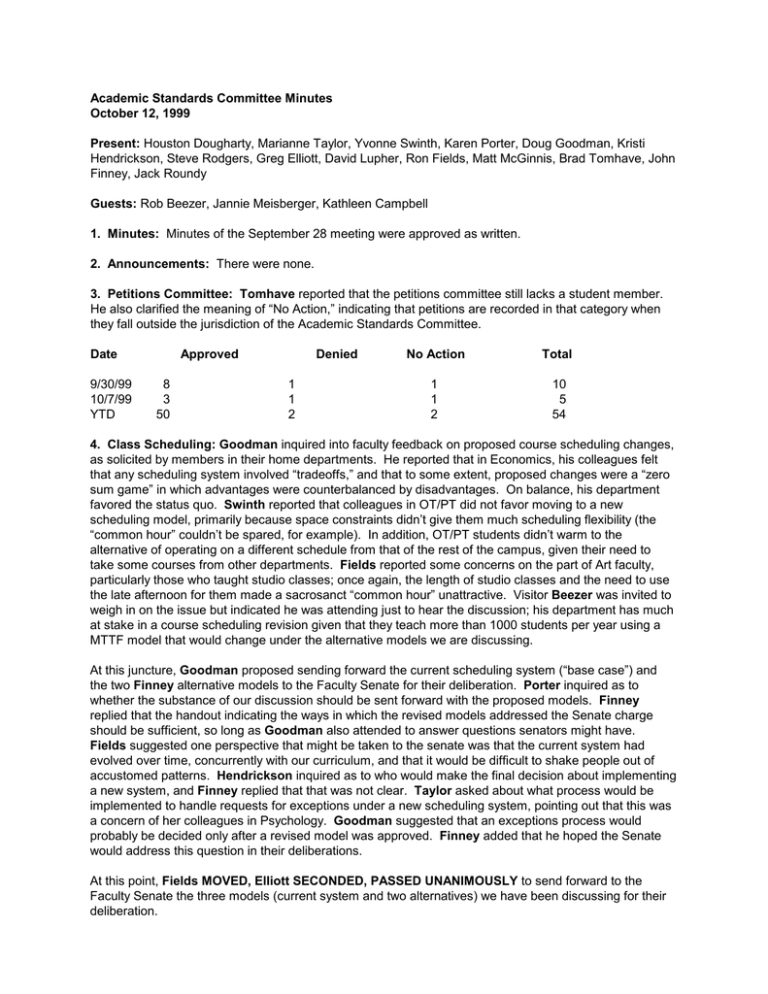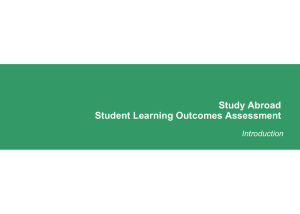Hendrickson, Steve Rodgers, Greg Elliott, David Lupher, Ron Fields, Matt... Academic Standards Committee Minutes October 12, 1999
advertisement

Academic Standards Committee Minutes October 12, 1999 Present: Houston Dougharty, Marianne Taylor, Yvonne Swinth, Karen Porter, Doug Goodman, Kristi Hendrickson, Steve Rodgers, Greg Elliott, David Lupher, Ron Fields, Matt McGinnis, Brad Tomhave, John Finney, Jack Roundy Guests: Rob Beezer, Jannie Meisberger, Kathleen Campbell 1. Minutes: Minutes of the September 28 meeting were approved as written. 2. Announcements: There were none. 3. Petitions Committee: Tomhave reported that the petitions committee still lacks a student member. He also clarified the meaning of “No Action,” indicating that petitions are recorded in that category when they fall outside the jurisdiction of the Academic Standards Committee. Date 9/30/99 10/7/99 YTD Approved 8 3 50 Denied 1 1 2 No Action Total 1 1 2 10 5 54 4. Class Scheduling: Goodman inquired into faculty feedback on proposed course scheduling changes, as solicited by members in their home departments. He reported that in Economics, his colleagues felt that any scheduling system involved “tradeoffs,” and that to some extent, proposed changes were a “zero sum game” in which advantages were counterbalanced by disadvantages. On balance, his department favored the status quo. Swinth reported that colleagues in OT/PT did not favor moving to a new scheduling model, primarily because space constraints didn’t give them much scheduling flexibility (the “common hour” couldn’t be spared, for example). In addition, OT/PT students didn’t warm to the alternative of operating on a different schedule from that of the rest of the campus, given their need to take some courses from other departments. Fields reported some concerns on the part of Art faculty, particularly those who taught studio classes; once again, the length of studio classes and the need to use the late afternoon for them made a sacrosanct “common hour” unattractive. Visitor Beezer was invited to weigh in on the issue but indicated he was attending just to hear the discussion; his department has much at stake in a course scheduling revision given that they teach more than 1000 students per year using a MTTF model that would change under the alternative models we are discussing. At this juncture, Goodman proposed sending forward the current scheduling system (“base case”) and the two Finney alternative models to the Faculty Senate for their deliberation. Porter inquired as to whether the substance of our discussion should be sent forward with the proposed models. Finney replied that the handout indicating the ways in which the revised models addressed the Senate charge should be sufficient, so long as Goodman also attended to answer questions senators might have. Fields suggested one perspective that might be taken to the senate was that the current system had evolved over time, concurrently with our curriculum, and that it would be difficult to shake people out of accustomed patterns. Hendrickson inquired as to who would make the final decision about implementing a new system, and Finney replied that that was not clear. Taylor asked about what process would be implemented to handle requests for exceptions under a new scheduling system, pointing out that this was a concern of her colleagues in Psychology. Goodman suggested that an exceptions process would probably be decided only after a revised model was approved. Finney added that he hoped the Senate would address this question in their deliberations. At this point, Fields MOVED, Elliott SECONDED, PASSED UNANIMOUSLY to send forward to the Faculty Senate the three models (current system and two alternatives) we have been discussing for their deliberation. 5. Changes to Logger Study Abroad Policy: Visitor Meisberger explained the need for study abroad policy changes under two heads: 1) policy statements should be brought into better harmony with our actual practices, and 2) policies should be adjusted to be consistent with “best practices” of study abroad programs around the country and the world, particularly as regards the University’s legal liability with respect to its selection processes. Addressing the particulars of her proposed changes, she added that study abroad should be regarded as a privilege, not a right. Current policy doesn’t address the occasional need to “deselect” a student who might otherwise be eligible to study abroad; proposed new language would permit consideration of a student’s conduct record in the decision about whether s/he was ready to be permitted the privilege of studying abroad. Dougharty began the discussion by asking for a clarification of the phrase “history of disciplinary problems.” Meisberger indicated that her intention was to institute a “release” system whereby students would agree to have their disciplinary records reviewed before permission to study abroad was granted. If they had committed conduct offenses, the Study Abroad Selection Committee would decide on a case-bycase basis whether those offenses were serious enough to merit denial of the privilege to study abroad. Swinth inquired, ‘then students who choose not to release their conduct records would be ineligible to study abroad?’ Meisberger said yes, they would be ineligible. She added that this review would also allow her to complete certain documents for our study abroad affiliates with required information to which she is not now privy. Elliott said that as a student, he would not know what to make of the proposed new language; he might think that any run-in with the student conduct system, however minor, would automatically exclude him, and this would lead him to abandon the application process. If the Study Abroad Selection Committee is to make judgment calls on the basis of the severity of disciplinary problems, then the proposed language should be changed to reflect that. Rodgers, Swinth, Dougharty, and Tomhave in rapid succession made suggestions for language changes to clarify how disciplinary records would enter into the selection process for study abroad. First it was proposed that academic probation (which automatically excludes a student) be set apart from “disciplinary history” (which would not), and that a process for the review of a student’s disciplinary history be outlined in the policy statement. Finney didn’t think we should articulate a disciplinary review process separate from the eligibility review process of which it is a part. Rodgers suggested that the eligibility statement regarding student conduct be rewritten to say, “Students who have a history of disciplinary problems will be subject to further screening procedures.” Tomhave, dissatisfied with the vagueness of the “disciplinary history” formulation, asked Dougharty if we could base exclusions on “incident reports.” Dougharty thought not, given that the conduct process moves from “incident report” to “hearing” to “determination of responsibility,” and that a student who has been found “not responsible” for an incident would still have an incident report on file. Tomhave rejoined that we could still institute a step in the eligibility process for study abroad for anyone with a disciplinary file, so long as we don’t build in an automatic exclusion. Finney agreed, arguing that the wording should not rule a student out in advance but should indicate how the eligibility decision with respect to student conduct will be made. Dougharty suggested that we could revise the study abroad application to include a release to review the disciplinary record. Tomhave agreed; making the release a part of the formal application process would ensure that the selection committee gets the information they need to make a judgment call. Meisberger and Dougharty argued that the eligibility requirements in the Logger should put students on notice about the conduct review. Tomhave suggested that “conduct probation” could be an exclusion parallel to academic probation in the eligibility language. Roundy objected that this would not give the Study Abroad Selection Committee explicit latitude to exclude someone with a worrisome conduct history who did not happen to be on “conduct probation.” Finney suggested that language further down in the policy statement could be amended to allow that latitude. Dougharty then proposed that the fifth bullet under eligibility requirements could continue to include academic and conduct issues, phrasing an exclusion as follows: “Students on academic or conduct probation are not eligible to participate in study abroad programs.” He also suggested that the first sentence in the paragraph addressing the selection process under “Application to Study Abroad” could be amended to read: “Students meeting the University’s and any program-specific eligibility requirements are selected for participation based on their cumulative grade average, grades in the appropriate foreign language (where applicable), the strength of the required essays, faculty letters of recommendation, an evaluation of the transcript and of discipline records, and other information provided in the application and University records.” This language would allow the committee to exclude students with problematic conduct records, even if they were not currently on conduct probation. A proposal was also made to add to the required materials as part of the application for study abroad both “A Signed Form to Release Discipline Records from the Dean of Students,” and “An Unofficial Transcript.” With this, we hastily adjourned at 9:53, agreeing to resume review of proposed study abroad policy changes when we meet next time. NEXT MEETING: Tuesday, October 26, 1999 at 9:00 am in Library 134. Respectfully submitted by the ASC amanuensis, Jack Roundy



